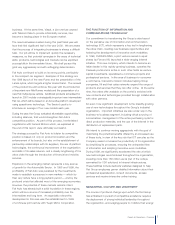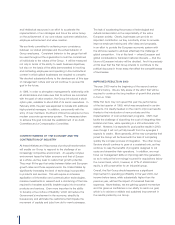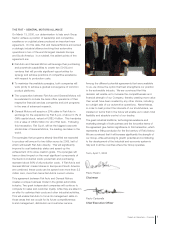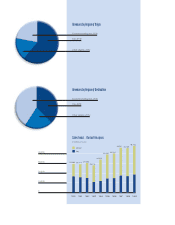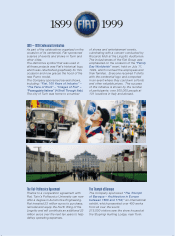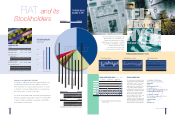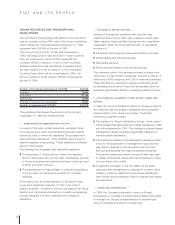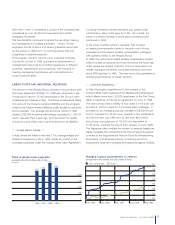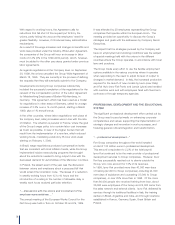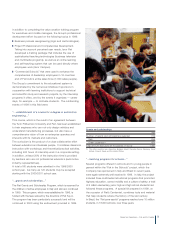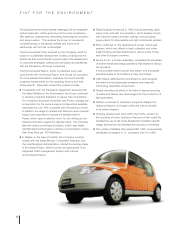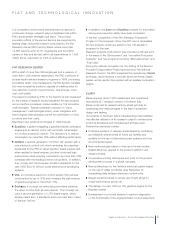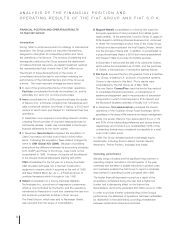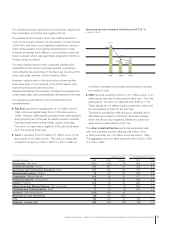Chrysler 1999 Annual Report Download - page 19
Download and view the complete annual report
Please find page 19 of the 1999 Chrysler annual report below. You can navigate through the pages in the report by either clicking on the pages listed below, or by using the keyword search tool below to find specific information within the annual report.
18
With regard to working hours, the Agreement calls for
reductions that fall short of the request put forth by the
unions, partly taking into account the employers’ need for
greater flexibility. However, it introduces heavy administrative
mechanisms.
As a result of the wage increases and changes in benefits and
work rules provided under the Industry-Wide Labor Agreement,
the companies of the Group will incur an increase in labor
costs of 3.4% (3% in the 1999-2000 period), which, however,
must be added to the other pay raises granted under previous
labor agreements.
As regards negotiations at the Company level, on September
30, 1999, the unions cancelled the Group-Wide Agreement of
March 18, 1996. They are currently in the process of defining
the requests that they will eventually submit to the Company.
Developments involving Group companies outside Italy
included the successful completion of the negotiations for the
renewal of the compensation portion of the Labor Agreement
for Metalworking Employees of Baden-Württemberg, in
Germany. This agreement, which has been used as a model
for negotiations in other areas of Germany, called for a wage
increase of 3.2% over a 14-month period, starting in March
1999, plus a 1% annual bonus.
In the other countries, where labor negotiations took place at
the company level, salary increases were in line with the rate
of inflation. The situation is peculiar in France, where the goal
of the Group’s wage policy is to contain labor cost increases
as much as possible, in view of the higher burden that will
result from the implementation of a new law, which reduced
working hours, mandating a statutory 35-hour work week
starting on February 1, 2000.
In Brazil, wage negotiations produced compensation levels
that are consistent with local inflation trends, while the Group
implemented incisive restructuring programs that brought
about the reductions needed to bring output in line with the
decreased demand for automobiles of the Mercosur countries.
In Poland, the salient event of the year was the discussion
between unions and employers about a proposed bill that
would amend the local labor code. The issues of a reduction
in weekly working hours from 42 to 40 hours and the
introduction of a ceiling in the number of allowable daily or
weekly work hours received particular attention.
“... discussions with the unions and involvement of the
employee representatives ...”
The annual meeting of the European Works Council for the
Fiat Group was held in Turin on October 28 and 29, 1999.
It was attended by 28 employees representing the Group
companies that operate within the European Union. The
meeting provided an opportunity to discuss the Group’s
strategies and goals with the addresses by Company Senior
Executives.
The impact that the strategies pursued by the Company will
have on employment and working conditions was the subject
of special meetings held with the unions in the different
countries where the Group operates, in accordance with local
laws and practices.
The Group made every effort to use the flexible employment
options available in the various countries where it operates
when responding to the need to adjust its level of output to
changes in market demand. In Italy, the increased production
required for the launch of new models by Iveco (new Daily)
and Fiat Auto (new Fiat Punto and Lancia Lybra) was handled
with overtime work and with employees hired with fixed-term
contracts or through temporary agencies.
PROFESSIONAL DEVELOPMENT AND THE EDUCATIONAL
SYSTEM
The significant professional development effort carried out by
the Group was focused primarily on enhancing corporate
competencies and values, supporting the implementation of
strategic changes and innovation in work processes, and
fostering general cultural integration and transformation.
“... professional development...”
Fiat Group companies throughout the world invested
a total of 122 million euros in professional development.
This amount is equivalent to 2.2% of the total payroll.
Isvor Fiat continued to be the main provider of professional
development services to Group companies. However, Isvor
Fiat has successfully reached out to clients outside the
Group, who now account for 13% of its revenues.
In 1999, Isvor Fiat provided more than 40,000 man-days
of training (22,000 to Group companies), including 24,000
man-days of assistance and counseling (13,000 to Group
companies), or over 25% more than in 1998. Of the more
than 60,000 people who received training from Isvor, about
35,000 were employees of the Group and 25,000 came from
the sales network and external clients. Isvor Fiat delivered its
services through its traditional facilities in Italy, the training
centers in Brazil, Argentina and India, and through locations
established in France, Germany, Spain, Great Britain and
Poland.


